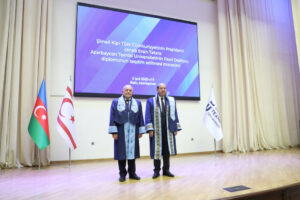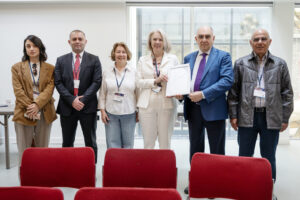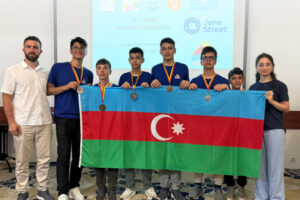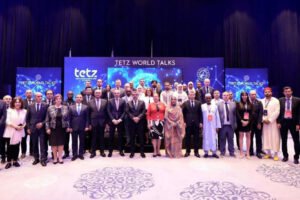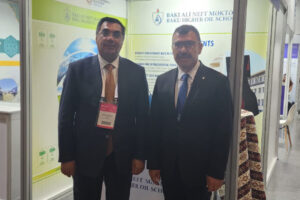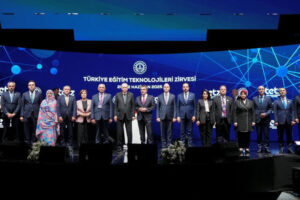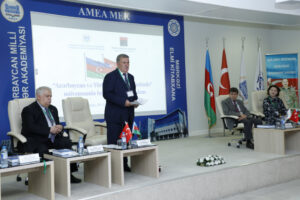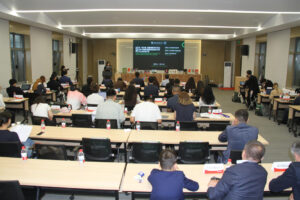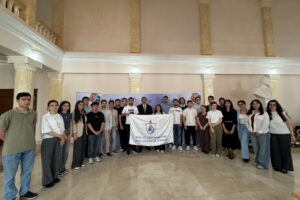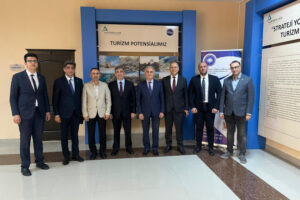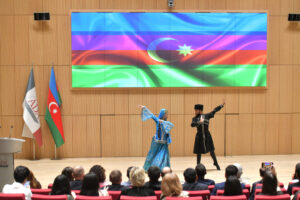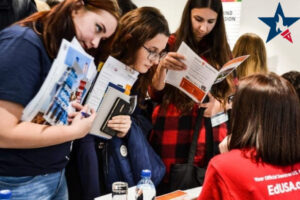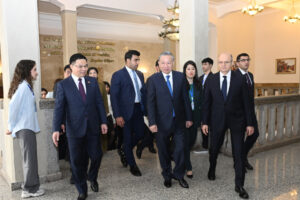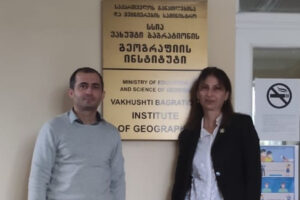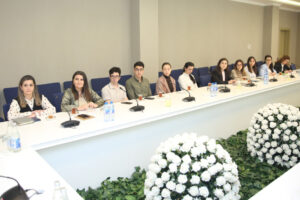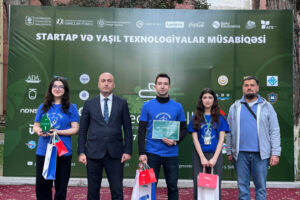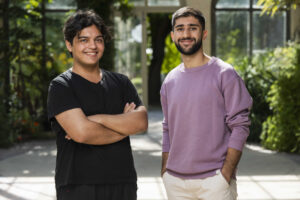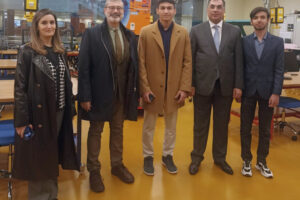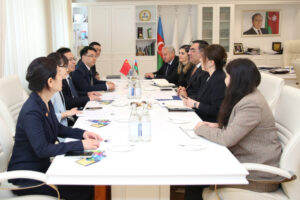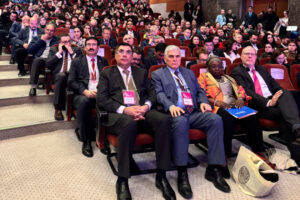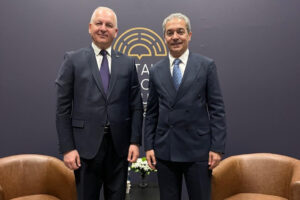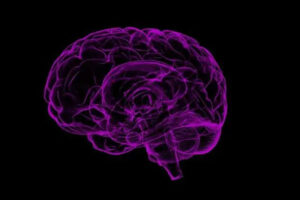Tokyo, 27 July, /AJMEDIA/
Vice-President of Azerbaijan National Academy of Science, Director General of the Institute of Information Technology of the Ministry of Science and Education of the Republic of Azerbaijan, Academician Rasim Alguliyev gave an extensive interview to “Xalq qəzeti” newspaper about the history of artificial technology (AI), its development stages and state-of-the-art, the research performed in this field in Azerbaijan, the realization of the state policy, preparing staff, the impact of AI technology on the labor market, as well as about the development prospects of AI.
– Mr. Alguliyev, first of all, we would like you to give some information about the emergence and development of artificial technology, which is urgent all over the world and of great interest to society.
– In general, if we look through the history, we can find numerous fantastic ideas related to AI in different periods. For example, one of the prominent science fiction scientists, Isaac Asimov, in his fantastic work “I, Robot” (1950) presented certain considerations and ideas about AI, and at the same time formulated the basic principles related to the creation and operation of robots. Asimov in “Three Laws of Robotics” (1942) defined a number of rules that every robot should follow when communicating with humans. These rules stated that the robot should not cause any harm to human health, should not pose a threat to life, should perform all the commands given by the human, and at the same time should protect its own existence.
The considerations set forth by A.Asimov are still relevant today. Following the 40s of the 20th century, a real scientific-theoretical and technological platform for the realization of these fantastic ideas appeared. Thus, the rapid development of science and technology has led to the emergence of computers. Scientists argue about an idea: “If a computer performs calculation and logical operations, can this device think, perceive, and make decisions?” These considerations have stimulated the rise of AI. It is worth noting here the famous scientist, Alan Turing. Turing’s 1950 article on “Computing Machinery and Intelligence” had a great contribution to the theory of AI.
Moreover, of course, other famous scientists have also set forth fundamental ideas about AI. The prominent scientist, Professor Lutfi Zadeh, also focused on the issues of AI in the 1950s. One of the first scientific studies related to the theory of AI was published by Zadeh in 1950 at Columbia University, USA. While still studying at Columbia University, he made real, rather than fantastical, assumptions about the “ability” of computers to think.
Note that AI as a term appeared in 1956. Thus, American scientist John McCarthy, who made an important contribution to the development of computer science and played an invaluable role in the formation of the theory of AI, first introduced the term “AI” at the summer workshop of Dartmouth College.
We must indicate that ideas related to AI were not very attractive in the mid-1950s and 1960s-1970s. Because its scientific-theoretical foundations were not developed enough to take over human intellectual functions. By the way, Lutfi Zadeh’s 1965 theory of “fuzzy sets” has led to a revolutionary change in the development of AI. Accordingly, Lutfi Zadeh’s theory was more general and closer to human thinking than other traditional logic theories.
Despite some of the above-mentioned achievements, there was not enough scientific foundations for the development of AI, consequently the interest for this field was not so satisfactory. However, in the 1980s and 1990s, the research conducted in the fields of fuzzy logic, artificial immune systems, genetic algorithms, particularly artificial neural networks led to the prosperity of AI again, its rapid development and the formation of its scientific and theoretical foundations.
All these achievements are also related to the development of computer technologies. The rapid development of computer science, the production of effective supercomputer technologies, and the development of mathematical foundations for solving various complex problems have already created great opportunities for the practical application of the AI theory.
When talking about the development history of AI, we should also indicate the role of the Internet. Thus, AI systems used to be implemented in separate autonomous systems before the emergence of the Internet. But after the Internet, new virtual realities have appeared. AI technologies began to be widely applied in the separate functions of the Internet and the delivery of services.
– But when did Azerbaijan start to focus on AI technologies? What kind of work did our scientists do in this field?
– Our scientists have begun to focus on the problems of AI since the 70s of the 20th century. Besides, the term “AI” was not widely used then, only various theoretical methods were used to solve its specific problems. For example, pattern recognition, decision-making and control under incomplete information, various forecasting issues, etc.
Fuzzy logic theory has been studied in our country since the 80s. Moreover, the theory of fuzzy logic began to be applied in the oil and gas industry in Azerbaijan, as well as in other different spheres, and important scientific results were obtained in this field. Azerbaijani scientists, as a part of Soviet science, explored the development of the scientific-theoretical foundations of AI theory, the development of new methods, and at the same time, they implemented various application issues using the potential of AI technologies at that time.
It is no coincidence that today research institutions under the Ministry of Science and Education of the Republic of Azerbaijan, the Azerbaijan National Academy of Sciences, and other research and higher educational institutions particularly concentrate on AI technologies. Scientific-theoretical problems of AI technologies refer to the main priorities of Azerbaijani science, and masters, PhDs and Doctors of sciences are also being prepared.
In general, in recent years, topics related to AI such as fuzzy logic and control, artificial neural networks, various intelligent systems, and expert systems have been widely studied by our scientists, and a number of relevant practical innovative solutions have been proposed so far.
Azerbaijani scientists are expanding their international scientific relations day by day, closely cooperating with prestigious scientific and educational centers of different countries. Many articles on the development of the scientific-theoretical basis of AI, as well as its application in various fields, are published in international scientific journals. These achievements are also represented in the international prestigious rankings of the world in the relevant field.
Currently, as in developed countries, new technological realities are emerging in our country. All these contribute to the development of our society, increasing the country’s economic and military potential, and strengthening its security. Consequently, Azerbaijani scientists support to solve national problems by strengthening the activity in the fundamental scientific and theoretical fields. As a result of the research conducted in this area, competitive smart devices and various systems with high intelligent characteristics and capabilities, are already being developed in our country.
– How can you estimate the state policy implemented in the field of AI in our country?
– First of all, it should be noted that during the last 2 decades, the steps taken by the President of the Republic of Azerbaijan Mr. Ilham Aliyev in connection with the global challenges and the Fourth Industrial Revolution in our country, the realization of the concepts of “smart city”, “smart village” and “smart infrastructure”, as well as the realization of innovative projects of special importance demonstrates the state support for the application of advanced technologies within the framework of the state policy. In the context of global technological challenges and transformations, the “Socio-economic development strategy for 2022-2026 of the Republic of Azerbaijan” and other important conceptual documents were adopted by the head of the state. All this shows the great care for the development of advanced technologies, particularly AI technologies in our country.
When talking about this topic, it is noteworthy to mention the modern weapons used by Azerbaijan in the Second Karabakh War which are also based on AI technologies.
It is not surprising that nowadays, special attention is paid to the development of AI technologies during the evaluation of the strategic potential of other countries. Currently, these issues are considered to be one of the priority tasks facing developed countries. Accordingly, countries are already adopting national strategies related to the development of AI. Presently, in Azerbaijan, some implementations are being performed for the AI Strategy development, complex measures are being executed guided by the challenges of the Fourth Industrial Revolution, targeted scientific research is being conducted and relevant institutions are being established.
On the other hand, a “green society” is being formed in our country, “green transformations” are taken into account in the development of all spheres. Currently, the formation of “green thinking” in society, the transition from traditional energy sources to alternative and green energy carriers, modernization and intellectualization of the technological infrastructure in our country are important priorities of the state policy.
These days, as in the developed countries, digital transformations take place in various spheres of human activity in Azerbaijan. Azerbaijan is integrated into the advanced world, closely cooperates with developed countries and leading transnational companies in several fields. In the context of digital transformations, the transformation of our government into an electronic one, the delivery of intelligent electronic services to citizens has already become a reality. As a result of digital transformations, people’s attitude towards advanced technologies is also changing. In modern times, they implement certain tasks related to acquiring the necessary knowledge, becoming a leading and productive force of society, trying to become electronic citizens of electronic Azerbaijan.
– You emphasized various projects and initiatives being implemented for the wide application of AI technologies in our country. Of course, this has a positive effect on the socio-economic development of the country and the labor market, but simultaneously, it also causes certain concerns. What is your attitude to this?
– In general, in human history, people have always pursued assistance and tried to lessen their work. People are always inventing new devices, mechanical systems, etc. to achieve their goals and make dreams come true. In all periods, they tried to live better, to gain new opportunities, to be in a ruling and dominant position in nature and community. All this has led to the formation of the labor market in accordance with the realities of each era and the level of development, the creation of new professions, and at the same time the disappearance of others. In the 21st century, humanity has the opportunity to create “intelligent technological servants” for itself. Today, AI-based robots and drones can be considered as “smart technological servants” of people.
There have been several industrial revolutions in human history. Undoubtedly, the main cause and driving force of these industrial revolutions is human intelligence. The First Industrial Revolution was related to the emergence and development of the steam engine, the Second Industrial Revolution – electricity, the Third Industrial Revolution – electronics, computers and the Internet, and the Fourth Industrial Revolution – AI, the Internet of Things, and other technologies.
Today, the society is on the verge of transition to a new stage of social and technological development being impressed by those innovative, widely transformative technologies. AI technology takes over various functions inherent to human intelligence, labor, and activity. Consequently, a new labor market is formed being affected by the objective development process, which requires new skills, abilities, thinking and behavior from humans. Today, the widespread use of online services in production, security, transport, trade, public catering and other fields due to AI technology in our country is generating a new segment of the labor market on the digital platform. Workplaces are becoming virtual, and the opportunities to run online in various fields are increasing.
The characteristics of the labor market in modern times are completely different compared to previous ones. Today, every citizen, having certain skills and experience, can perform one or more tasks through a mobile phone. Because mobile devices are no longer just a means of communication, they have also become work tools and workplaces. People earn money by providing various educational, advertising-marketing, consulting, and commercial services on social networks. Another point is that due to the rapid development of ICT and AI, physically disabled people are also involved in the labor market; they realize their potential by operating on the Internet, and get chance to become an active workforce.
Furthermore, the scope of the virtual labor market is not limited to a single country. Our citizens join the global virtual labor market, get jobs in foreign countries and meet their financial needs.
– Mr. Alguliyev, you emphasized that due to AI technologies, a labor market with completely new characteristics is being formed all over the world, as well as in our country. This, unquestionably, requires the training of highly skilled personnel with updated knowledge. What implementations are being done in this field in our country?
– In our country, for the formation of a new generation tolerable to the challenges of the modern era, there is a great need for technological knowledge, mathematics, physics, chemistry and other sciences, which constitute the basis of this knowledge. In other words, digital transformations also impose new tasks on the country’s education, the relevant authorities are taking measures to ensure citizens to have the minimum knowledge in the field of ICT, and to generate technology and information culture.
As we know, the Ministry of Science and Education of the Republic of Azerbaijan is implementing the STEAM (Science, Technology, Engineering, Art and Math) project. This project is a modern educational concept representing science, technology, engineering, creative skills and mathematical knowledge. The project aims to generate enthusiasm for technological knowledge in students, increase their ability to use innovative technologies and provide opportunities for higher education in the field of exact sciences in the future. Specialists working in the relevant field in the country’s secondary schools hold various activities within the framework of the STEAM project.
In this field, the Ministry of Science and Education also organizes a very advanced and important national competition “Scientists of Tomorrow”. University students and students of secondary educational institutions in the country participate in local and international exhibitions and competitions.
For example, I can mention that most of the exhibits and projects exhibited by our country at the “TEKNOFEST Azerbaijan” held in Baku in May, 2022, were based on AI technologies.
Today, higher education system of Azerbaijan focuses on personnel training in the field of AI, and new specialties are announced. Besides, conditions are created for the most talented pupils and students of Azerbaijan to study in the field of ICT and AI in the top ranked universities of the world within the framework of the “State Programme for the education of young people at prestigious higher education institutions of foreign countries for 2022-2026”. I believe that all these steps, the training of new generation personnel in accordance with the digital transformation processes taking place in the world will prosper in the near future.
We can say with confidence that AI technologies, computer science, related software engineering, computer engineering and other ICT-related specialties are becoming popular in our country. Fortunately, especially in recent years, most parents are making efforts for their children to study computer science in the future.
– Mr. Alguliyev, all this is of course important for the country’s development and strengthening of its strategic potential. However, the emergence of certain risks related to the development of AI technologies is also predicted, and this raises certain concerns in society. We would like to know your thoughts about this.
– Undoubtedly, we can agree with the considerations regarding the emergence of risks related to the application and development of AI and other digital technologies. Because with the emergence of any technology, the risks and dangers created by it also become relevant, along with its positive aspects, it is necessary to focus on its negative aspects too. Simply, we have to deeply explore, comprehend where the relevant risks originate from and take certain measures. On the other hand, one of the main reasons for the emergence of risks is related to the fact that all these processes take place in the virtual space.
Specifically, these risks are greater in critical IoT-based infrastructures. Because many countries have had some negative experiences related to external intervention in critical infrastructures, preventing their activity, etc. From this point of view, guided by the new tasks set before the Azerbaijani scientists and technologists by the state policy and fundamental reforms implemented in the relevant field, it is necessary to focus on cyber security and cyber resilience issues in the country.
In general, all kinds of new technologies have certain vulnerabilities and shortcomings. The adversary or the enemy can take advantage of it and cause serious damage to the country, various institutions and citizens. The point is that cyber threats themselves are becoming intelligent. That is, all these intelligent technologies, at the same time, become a very powerful tool and weapon in the hands of malicious people. Therefore, to ensure the country’s cyber security in this field, and to further increase its cyber resilience, the relevant institutions, scientists and specialists are mobilizing their intellectual potential and implementing complex work.
We know that AI technologies take on the most complex functions and use deep learning methods based on artificial neural networks to perform these functions. A serious point as the opacity and inexplicability of the knowledge generated in the smart technological environment, the decision itself, does not allow predicting how the AI system will behave in the future, and therefore serious risks arise.
Reconstruction works of critical infrastructures as energy, transport, etc., transformation of vital traditional systems and facilities into a new platform, modernization of industry and adaptation to the requirements of the 4th Industrial Revolution, and formation of the “green economy” and “green infrastructure”, which are currently set before scientists and specialists as a task and challenge by the head of the country, etc. are the remarkable measures implemented. All this already requires serious solutions on ensuring cyber security and cyber resilience of new infrastructures based on technological innovations on the digital government platform.
The application of IoT technologies also makes the issue of protecting personal data on people’s life and activities relevant. Thus, ensuring the safety of all types of technologies, their reliable operation, other similar significant issues should always be on the agenda. Along with benefiting from any technological innovation, we should be ready to systematically fight against the threats it creates.
– The deep penetration of AI technologies into all spheres of social life leads to the emergence of new social relations in society. This requires the improvement of the country’s legal system and the regulation of new relations by law. What is the status of the works in this field in our country?
– Certainly, modern challenges claim to develop the legal system of all states, including our country, adequate to the technological challenges of the modern era, as well as AI technologies.
Azerbaijani government have adopted certain regulatory and legal documents in this field in different periods. However, there is a need to adopt new laws related to AI technologies, which are rapidly becoming a reality in our country today. Because people use drones, robots and other various devices and software systems in their daily life and work. We should be fully aware that modern technologies can damage society, people’s health, property, etc. Therefore, we have to concentrate on this issue more, and form an appropriate normative and legal framework taking into account international experience.
In addition, I would like to mention that AI technologies can cause serious problems both at the national and international level, as they are global in the virtual platform. Consequently, all countries of the world should fight together with possible threats and be closely ivolved in their prevention.
– Mr. Alguliyev, your recent participation in the “Human Brain Project Summit: 2023” held in Marseille, France, and your report on the results of the visit caused great curiosity in society. We would like you to provide more detailed information about this visit.
– Basically, if we look through the evolution of AI technologies, we will see that these technologies mainly take advantage of human natural intelligence. AI technologies, on the one hand, appear as a continuation and extension of the natural intelligence of people, and on the other hand, biological world is another source of intelligence that these technologies take advantage of. Subsequently, scientists first studied the work principle of natural neurons, and then created an artificial neuron based on it. Explicitly, artificial neural networks, as well as genetic algorithms, ant algorithms, artificial immune systems, etc. are the main sources of the development of AI technologies today. In a word, AI technologies are developed on the basis of both the scientific-theoretical and practical methods created by natural intelligence, as well as the study, imitation, and modeling of the activities and behaviors of real living-beings.
Scientists in various fields throughout the world are currently exploring the nature, essence, activity, structure of the brain itself, how it is controlled, modeled, and the human thinking.
The issues on the summit agenda can be basically grouped in two fields. The first group involves the use of special microchips, devices, and various systems based on AI technologies to study and eliminate various brain diseases. This means that scientists are thinking of applying AI technologies to treat various brain diseases (Parkinson’s, epilepsy, Alzheimer’s, etc.) which cannot yet be cured by modern medicine, and to create digital twins of individual brain functions. Scientists are already conducting research on this problem and achieving certain scientific results.
Another issue refers to the study the functions of the brain, their in-depth analysis, getting any idea and transforming it into AI. Specifically, we are talking about new generation AI systems that can partially take over the functions of the human brain.
The topics discussed at the summit are of interest to Azerbaijani scientists today. I believe that conducting multidisciplinary research and training highly qualified personnel at the intersection of AI, neuro and cognitive sciences is necessary.
– Mr. Alguliyev, what can you say about the prospects of AI for the near future?
– In the early days of the Internet, it was designed to serve people, provide communication and meet their information needs. In recent years, we are witnessing that the Internet no longer connects only people, regardless of time and place, we can connect the online environment through any object, device and various sensors. Taking advantage of these opportunities, in the context of the transformations taking place, AI technologies generate new realities in society.
Due to the emergence of smart systems, devices, robots and becoming an integral part of people’s lives, the civilization is predicted to enter a new stage of development. Therefore, the 5th and 6th industrial revolutions are believed to be not far away. The intellectualization of the Internet, the “web”, the emergence of collective AI, as the next development stage of AI technologies, constitute the basis for a new social and technological society for the first time in human history. In the social and technological society, people will work with cobots, i.e., the robots working jointly, they will have dozens of co-workers, which requires new relationships and new rules of behavior. As a result of collective natural intelligence and collective AI living together, communicating with each other, being useful to each other, in some cases causing damage and creating some threats, certain unpredictable perspectives may emerge. Naturally, there are numerous futurological ideas in this regard.
As we know, AI is rapidly entering human life and supporting the development of society. At this time, the problem of collecting and processing large volumes of data from smart devices such as sensors, video cameras, etc. connected to various things, becomes pressing. Available computer systems, servers, communication channels, etc. are powerless in front of this information explosion. Therefore, new approaches to data processing issues, which are the core of this entire technological environment, are emerging. Now quantum computers, quantum servers, and other quantum technologies are mentioned as one of the ways out of this explosion. Currently, the experience of advanced countries shows that quantum technologies to be of great strategic importance. In this regard, the improvement and application of quantum technologies is one of the priority tasks facing the developed countries.
The integration of advanced technologies as AI technologies, biotechnologies, biomedical technologies, nanotechnologies, etc. opens up new perspectives for our society and our future. Revolutionary innovations are predicted particularly in medicine and in various spheres of human life.
Finally, I would like to emphasize that the emergence of superintelligence as a result of the “intelligence” of technologies, and the possibility of their surpassing the human in the future, naturally raises certain considerations in society. However, in this regard, we have to be realistic and at the same time optimistic. Thus, if technological sovereignty is ensured as a result of strengthening the state’s technological potential in the context of global development, such intellectual technologies will contribute to the country’s development in all areas. Consequently, the citizens of the 4th Industrial Revolution should be formed, technology culture should be introduced in the society, and people should constantly acquire the necessary technological knowledge in accordance with the rapid development pace of technologies.


